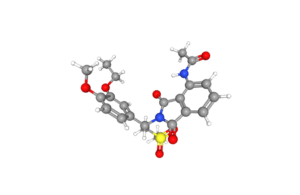
[Image courtesy of PubChem]
In two animal models, researchers found animals predisposed to mild-to-heavy alcohol use dropped their alcohol intake after taking apremilast, a phosphodiesterase 4 (PDE4) inhibitor. The scientists also tested apremilast in a Phase 2a study involving 51 subjects with moderate-to-severe alcohol use disorder. The subjects reduced their alcohol consumption from an average of five drinks per day to two.
PDE4 is tied to both alcohol and nicotine dependence.
“I’ve never seen anything like that before,” noted co-senior author and Oregon Health & Science University (OHSU) professor Angela Ozburn, in a news release.
The drug was also generally well tolerated in the study.
The researchers note that apremilast is better tolerated than than older PDE4 inhibitors such as rolipram and ibudilast, which can cause nausea and vomiting.
The Journal of Clinical Investigation published the research.
FDA first approved apremilast in 2014 as a treatment for psoriatic arthritis. Indications followed for plaque psoriasis and ulcers associated with Behçet’s disease.
While more research is required, the medication could be an “excellent candidate” for treating alcohol use disorder.
FDA has approved three treatments for AUD: disulfiram, naltrexone and acamprosate.
Disulfiram became the first therapy to treat AUD in 1949. The drug bolsters concentrations of concentration of acetaldehyde, a toxic byproduct of alcohol.
Naltrexone, an opioid receptor antagonist, won approval for alcohol dependence in 1995.
FDA had approved another drug, acamprosate (Campral) for AUD in 2004.
The researchers found that apremilast lowered binge-like alcohol intake and behavioral measures of alcohol use disorder in a mouse model prone. They also found it was effective at curbing excessive drinking in models of stress-facilitated drinking and alcohol dependence.
The researchers hypothesized that the drug could be effective by bolstering neural activity in the nucleus accumbens, which plays a role in drug self-administration behaviors. The brain region is a common target in addiction and depression.
The company Clearmind Medicine (Nasdaq:CMND) is testing 5-methoxy-2-aminoindane (MEAI) as another potential therapy for AUD.